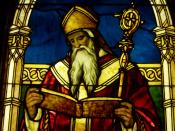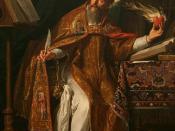St. Augustine uses his focus on the fact that God may exists in the same extent which wisdom and truth exists, which is as concepts or ideas in the mind but not reality. He shows that there is evidence of God but not a powerful creator. To Augustine, God exists but requires him to exist for the basis of his argument. St. Augustine focuses on memory as an unconscious knowledge, which eventually leads him to his knowledge of God. Augustine is no longer telling events of the past, but only of present time.
Augustine starts his analysis of memory in a description of a house. The storehouse is a place where objects are retrieved, deposited, and re-stored; just like the memory where images are kept, and in need recovered. Augustine gives a characterization of memory as if it was materialistic; it is reliable, everything has its own place in it, and it can contain unlimited information.
The memory exists in all things in the past, present and no one can take it away from us.
St. Augustine believed that the ideas in someones memory must have been in his mind before he learned it, waiting to be recognized. Augustine suggests, "It must have been that they were already in my memory, hidden away in its deeper recesses, in so remote a part of it that I might not have been able to think of them at all, if some other person had not brought them to the fore by teaching me about them" (X: chapter 10, 218). In recognizing an idea the inclusive memory he has in his mind. In addition memories that are neglected slip back into remote places of the memory and these memories evolve becoming new ones again.
Augustine then started to focus on the search...


